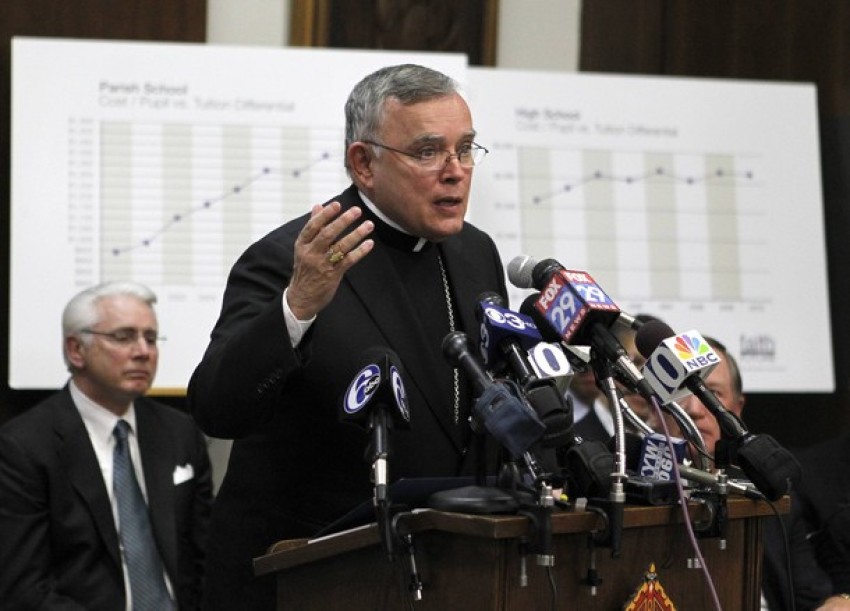Roman Catholic Archbishop Calls Self-Described Christians 'Pagan'

In a recent speech to the Junipero Serra International Convention in Mallorca, Spain, Archbishop Charles J. Chaput attacked lukewarm Christians as "pagan." While insulting on its face, the statement received support and clarification from both the Archdiocese of Philadelphia and the Dean of Theology at Catholic University.
"The meaning of the archbishop's comments is quite clear in the context of the talk (especially in light of his references to Smith and Lasch) and not at all controversial," wrote Francis X. Maier, special assistant to the Archbishop, in an email to The Christian Post.
"If you reread the NBC10 story, it strains rather obviously to create an issue where there is none," he added.
The Archbishop said in part, "A 'new' evangelization must start with the sober knowledge that much of the once-Christian developed world, and even many self-described Christians, are in fact pagan."
The next few sentences provided context. "Christian faith is not a habit. It's not a useful moral code. It's not an exercise in nostalgia. It's a restlessness, a consuming fire in the heart to experience the love of Jesus Christ and then share it with others – or it's nothing at all."
"We see that he was very clearly trying to elicit and bring alive people's faith life," said Father Mark Morozowich, assiciate professor of Liturgical Studies and Sacramental Theology and dean of the School of Theology and Religious Studies at the DC-based Catholic University of America.
"It was just a rhetorical device to challenge people," Morozowich told CP. "Are we really living life and light the way Christians ought to?"
Morozowich said the archbishop merely intended to showcase the life of Junipero Serra to Christians, encouraging them to use his life as an example to get "in touch with and alive with a personal relationship with Jesus Christ as their Lord and Savior."
Chaput's speech centers on the lessons modern Christians can learn from Father Junipero Serra, who was born 300 years ago this year. The archbishop discussed "the world he was born into, and what he achieved in it," along with "the kind of world we face today," and "whether and how Serra has any continuing importance for the Church in a very different age."
Serra's world, Chaput explained, lacked electricity, modern medicine, primitive communications and transportation, and a great deal of death. It also "had the texture of intense religious and political competition, and huge economic expansion."
In this great age of turmoil, Serra abandoned his success as a university lecturer in Spain to struggle as a missions leader in Mexico. Despite a leg would which "pained him for the rest of his life," Serra "still walked thousands of miles in his mission work with the native peoples of Baja and Alta California," founding the first mission in the modern state of California in 1769. His system "would eventually include 21 California missions spanning hundreds of miles and many
But Serra also demonstrated tremendous courage in fighting "with military thousands of native converts to the Catholic faith," and political leaders in New Spain who sought to abuse or exploit the Indian population." Chaput listed his virtues: humility, audacity, foresight, endurance, political skill, leadership ability, and most important, "a zealous Franciscan faith."
Today, the "once-Christian developed world" presents an entirely alien environment. Among many changes, Chaput pointed out "some of the same civil authorities that once happily honored Father Serra with statues in Golden Gate Park and the U.S. Capitol building now work even harder to restrict the freedom of American religious communities, force the Church out of public debate, and impose same-sex 'marriage' as the law."
His "pagan" quote emerges in this context – diagnosing the spiritual maladies modern Christians suffer today. He listed two, from Notre Dame's distinguished social researcher Christian Smith and scholar Christian Lasch.
Smith understood teen religion as "moralistic therapeutic deism," which believes the God created the world, wants people to be nice and fair, sets happiness and satisfaction as the goal of life, only gets involved to help people solve their problems, and welcomes people into heaven when they die.
In The Culture of Narcissism, Lasch argues that "consumer culture tends to create weak personalities dependent on group behavior and approval, and therefore more susceptible to advertising and product consumption."
Both of these philosophies lead Christians away from making Jesus Christ their sole passion, and Chaput points to Serra as someone who "heard the Gospel, and believed, and acted on it."
"Today, here, beginning now, God calls us to the privilege of doing the same."



























